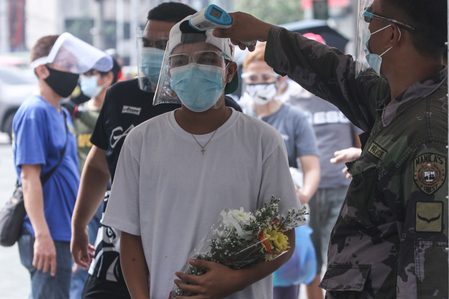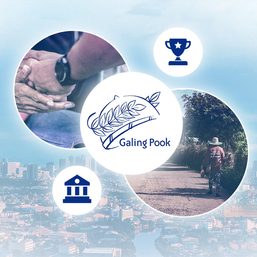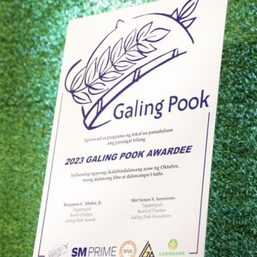SUMMARY
This is AI generated summarization, which may have errors. For context, always refer to the full article.
![[OPINION] Where is health in our national security interests?](https://www.rappler.com/tachyon/2020/10/rename.jpg)
The global map of COVID-19 cases is stark evidence of a cautionary tale still being told. Uncertainties on vaccine availability, immune response, and even viral properties still puzzle scientists, floor leaders, and governments – and kill and ill people with no let-up.
In 2009, after the H1N1 swine flu pandemic, Bill Gates warned of the next big pandemic that could hit the world. And, as one of the richest and most influential persons investing in global health security, he was right. But being a citizen of the country which ranked first (best) in the Global Health Security Index in 2019, this statement did not really bode well for a broad understanding of health security and the preparedness that it entails. Some lessons are really learned the hard way.
More ironically, in the Global Risks Report of 2019 which factors in the impact and likelihood of events that can shake the world order — which listed extreme weather events, climate change impacts, and major natural disasters as the top 3 risks, in decreasing order — the spread of infectious diseases, sans the word “pandemic,” was just ranked to be of slightly above average impact and low likelihood. We know this much is not true.
For the past two decades, the world has had a generous share of infectious diseases. In fact, two pandemics that served as “poster diseases” for global health security, Severe Acute Respiratory Syndrome (SARS) in 2003 and the H1N1 influenza in 2009, came about during this period. There were also major emerging and reemerging infectious disease outbreaks and epidemics that threatened certain countries including the Philippines, e.g. Chikungunya, Zika virus, cholera, measles, Ebola, and Middle East Respiratory Syndrome.
These accounts bring to light forecasting issues that can impact preparedness, and recent lessons learned that can guide current and future response. These also underscore the “low politics” treatment of infectious diseases and health threats in the big scheme of things. In hindsight, this can be gauged by assessing global and country responses to COVID-19, which with a few exceptions do not leave much to be desired.
Pandemics are likened to wars and major natural disasters because of the devastation they bring. We don’t see troops bleeding on a battleground or people crushed under the rubble of demolished buildings, yet the prevailing fear of the invisible enemy – hunger from economic damages and the uncertainty of pandemic solutions putting us at our wits’ end – are enough reasons to frame it as a security crisis.
We’ve learned again this time that pandemics are not solely health issues to be addressed by the health sector alone. They have cascading economic, social, political, and security consequences that should be dealt with using a holistic take.
This is the essence of health security.
Theoretical as it may seem, I think it is a must that we understand and reframe our view of health security now in light of our COVID-19 experience. Plainly misunderstood or seen through the wrong lens, health security needs a second look.
To understand health security, it is important to explore the literature. Most definitions, even those by the World Health Organization and the US government, though clearly stated and easily understood, are skewed towards the public health and medical field. They do not fully capture the essence of health security as a function of multisectoral and transdisciplinary approaches that are so necessary in moving forward. Also, they miss out on the importance of prevention and the very principles that should be adhered to from the standpoint of people, i.e. human-centeredness.
Arguably, the definition needs to be more encompassing. Hence, it is prudent to review the definition of human security of which health is a part.
And so, we ask: where is health in our national security interests? It’s no surprise that our existing national security policies are focused more on traditional security threats like public safety, law and order, justice, territorial integrity, terrorism, and sociopolitical stability. Non-traditional threats would comprise another (but lesser) list. When this group is referred to, health issues would be scantily covered if not entirely missing.
In the UN definition, human security means freedom from fear and freedom from want; it involves promoting the survival, livelihood, and dignity of people; it implies that there are multifaceted dimensions to address: economic, food, environmental, personal, community, political, and not surprisingly, health.
I propose a Philippine working definition of health security that borrows by and large the human security definition. We need a human-centered, not militaristic, approach to our pandemic response and recovery. Because we are also at risk of emergencies and disasters due to other health hazards besides infectious diseases, we need to reframe our understanding of what constitutes health security.
From a threat perspective, health security has always been about pandemics, emerging and reemerging infectious diseases, bioterrorism, and chemical, radiological, and nuclear threats – anything terrorism-related. Focus is always on pandemic preparedness, and this traditional perspective is understandably geared towards the military.
The proposed paradigm shift that could transform our understanding of health security should also take into account the health consequences of natural disasters, climate change impacts, communicable diseases, non-communicable diseases and even antimicrobial resistance. Coverage should be expanded to include Universal Health Coverage (UHC), primary health care, health systems strengthening, and community resilience. The perspective should be that of human security, so that health security is human-centered, development-oriented, and rights-based.
There are game-changers that can make this transformation happen. The transition from national to international in pushing for solutions is gaining traction. Increased cooperation, collaboration, and opportunities because of actual COVID-19 challenges being faced now are happening before our very eyes. Most importantly, the convergence of health and human security as a policy issue is moving fast.
Latest developments include the crafting of the latest iteration of the National Action Plan (NAP) against COVID-19, with emphasis on a people-centered approach, Philippine participation in global COVID-19 treatment and vaccine trials, the development of regional Standard Operating Procedures (SOPs) and other mechanisms for effective and timely pandemic response, legislative measures for the creation of the Philippine Centers for Disease Control (CDC) and a National Health Security Council, and the creation of more spaces for furthering discussion of health as a non-traditional security threat.
Health security issues depicted by the pandemic and a host of other health threats can only get worse before they get better, so we must strive to strengthen our capacities to anticipate, prevent, prepare for, and respond to these existential realities.
As the foremost health security thinker in our region Dr Mely Caballero-Anthony wrote, “It’s not only about preventing outbreaks and spread of infectious diseases, but also about ensuring people’s well-being and safety.”
This is the essence of health security. – Rappler.com
The author is a physician and public health practitioner who specializes in health emergency and disaster risk management. He is also a professor of public health and a Fulbright US-ASEAN scholar who investigated the topic of health security in the US just before the onset of COVID-19.
Add a comment
How does this make you feel?



![[Newsstand] The Marcoses’ three-body problem](https://www.rappler.com/tachyon/2024/04/tl-marcoses-3-body-problem.jpg?resize=257%2C257&crop=451px%2C0px%2C1080px%2C1080px)
![[Edgewise] Preface to ‘A Fortunate Country,’ a social idealist novel](https://www.rappler.com/tachyon/2024/02/a-fortunate-country-february-8-2024.jpg?resize=257%2C257&crop_strategy=attention)
![[New School] When barangays lose their purpose](https://www.rappler.com/tachyon/2024/02/new-school-barangay.jpg?resize=257%2C257&crop=414px%2C0px%2C1080px%2C1080px)
There are no comments yet. Add your comment to start the conversation.